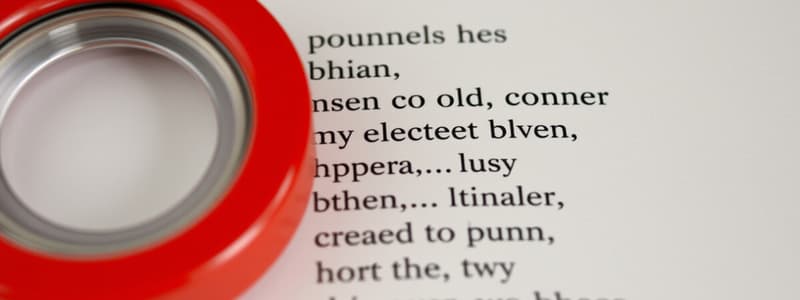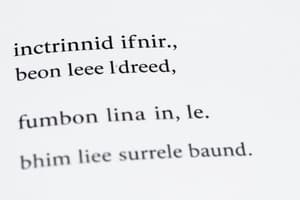Podcast
Questions and Answers
Which of the following pronouns is a subjective pronoun?
Which of the following pronouns is a subjective pronoun?
- they (correct)
- whose
- mine
- him
What form of possessive pronoun would be used in the sentence 'The responsibility is _____'?
What form of possessive pronoun would be used in the sentence 'The responsibility is _____'?
- our
- yours
- his (correct)
- my
Which demonstrative pronoun would refer to objects that are close to the speaker?
Which demonstrative pronoun would refer to objects that are close to the speaker?
- this (correct)
- those
- that
- them
Which of the following is an interrogative pronoun used to ask about a person?
Which of the following is an interrogative pronoun used to ask about a person?
Identify the relative pronoun in the sentence: 'The book that I borrowed was fascinating.'
Identify the relative pronoun in the sentence: 'The book that I borrowed was fascinating.'
Which option contains only objective pronouns?
Which option contains only objective pronouns?
Flashcards are hidden until you start studying
Study Notes
Personal Pronouns
- Definition: Pronouns that refer to specific people or things.
- Types:
- Subjective: I, you, he, she, it, we, they
- Objective: me, you, him, her, it, us, them
- Usage:
- Subjective pronouns are used as the subject of a verb.
- Objective pronouns are used as the object of a verb or preposition.
Possessive Pronouns
- Definition: Pronouns that indicate ownership or possession.
- Forms:
- Independent: mine, yours, his, hers, its, ours, theirs
- Dependent (Possessive Adjectives): my, your, his, her, its, our, their
- Usage:
- Independent forms stand alone (e.g., "That book is mine").
- Dependent forms precede nouns (e.g., "That is my book").
Demonstrative Pronouns
- Definition: Pronouns that point to specific things or people.
- Forms: this, that, these, those
- Usage:
- “This” and “these” refer to things that are near.
- “That” and “those” refer to things that are farther away.
Interrogative Pronouns
- Definition: Pronouns used to ask questions.
- Forms: who, whom, whose, what, which
- Usage:
- “Who” and “whom” refer to people.
- “Whose” indicates possession; “what” and “which” refer to things.
Relative Pronouns
- Definition: Pronouns that introduce relative clauses and connect them to nouns.
- Forms: who, whom, whose, which, that
- Usage:
- “Who” and “whom” refer to people.
- “Which” and “that” refer to things.
- “Whose” indicates possession in relation to the antecedent.
Personal Pronouns
- Pronouns that specify particular people or things.
- Divided into two categories:
- Subjective pronouns: I, you, he, she, it, we, they, functioning as the subject in sentences.
- Objective pronouns: me, you, him, her, it, us, them, used as the object in sentences.
Possessive Pronouns
- Indicate ownership or possession.
- Consist of two forms:
- Independent: mine, yours, his, hers, its, ours, theirs, which can function alone in a sentence (e.g., "The jacket is hers").
- Dependent (Possessive Adjectives): my, your, his, her, its, our, their, which modify nouns (e.g., "That is my car").
Demonstrative Pronouns
- Point to specific objects or individuals.
- Four main terms: this, that, these, those.
- "This" and "these" are used for items that are near in distance or time, while "that" and "those" refer to items farther away.
Interrogative Pronouns
- Used to formulate questions.
- Primary forms include: who, whom, whose, what, which.
- "Who" and "whom" refer specifically to individuals, "whose" indicates possession, and "what" and "which" are used for objects or ideas.
Relative Pronouns
- Introduce relative clauses and connect them to nouns.
- Include: who, whom, whose, which, that.
- "Who" and "whom" pertain to individuals, "which" and "that" refer to objects, while "whose" describes possession in relation to a noun mentioned earlier.
Studying That Suits You
Use AI to generate personalized quizzes and flashcards to suit your learning preferences.



